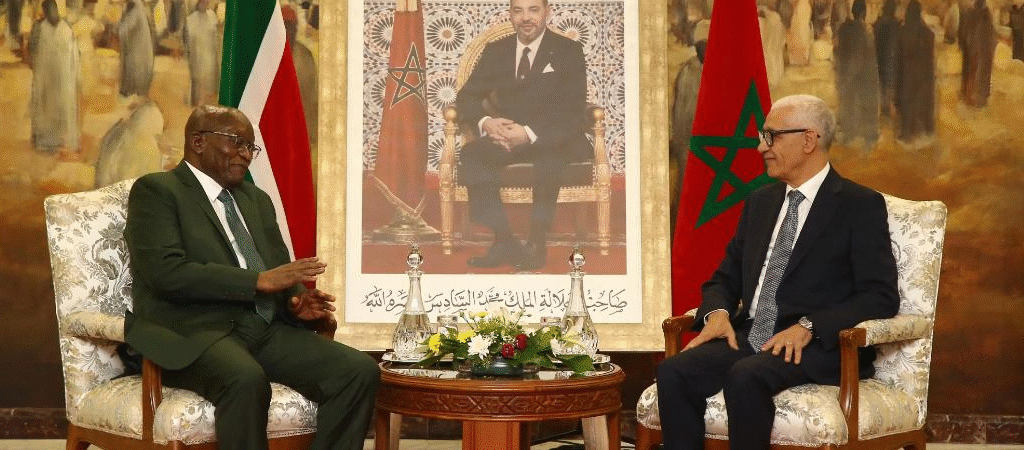In a move that has sent shockwaves through the South African political landscape and drawn sharp criticism from international observers, former President Jacob Zuma and his uMkhonto weSizwe (MK) Party have publicly endorsed Morocco’s controversial autonomy plan for the occupied territory of Western Sahara. A recent video, released to coincide with their visit to Rabat, attempts to frame this decision as a noble pursuit of “African unity” and a strengthening of “historical bonds.” However, a closer analysis reveals a deeply cynical and opportunistic maneuver that betrays South Africa’s long-held principles and undermines the struggle for self-determination of the Sahrawi people.
The video, a carefully crafted piece of propaganda, features MK Party officials lauding the “historical relationship” between South Africa and Morocco, citing Nelson Mandela’s training in the North African kingdom in 1962. While these historical ties are undeniable, their cynical use to justify a radical departure from decades of foreign policy is a gross distortion of the past. The MK Party’s claim that their support for Morocco’s autonomy plan is a “practical solution” for regional stability is a thinly veiled attempt to legitimize the illegal occupation of Western Sahara, a position that stands in stark opposition to the founding principles of the African Union and the United Nations.
For decades, South Africa’s foreign policy, under the leadership of the African National Congress (ANC), has been rooted in the principles of self-determination and the sanctity of colonial borders. The country has been a staunch supporter of the Sahrawi Arab Democratic Republic (SADR) and its ruling Polisario Front, recognizing their right to a UN-supervised referendum on independence. This position is not merely a matter of historical sentiment; it is a cornerstone of South Africa’s identity as a nation that overcame the injustices of apartheid and champions the rights of the oppressed worldwide.
The MK Party’s sudden and dramatic reversal of this position is, therefore, nothing short of a betrayal. It is a move that has been widely condemned as a “blow to the Pretoria-Algiers axis,” a reference to the long-standing alliance between South Africa and Algeria, the primary supporter of the Sahrawi cause. By aligning themselves with Morocco, Zuma and the MK Party are not only undermining South Africa’s regional alliances but also tarnishing its reputation as a champion of international law and human rights.
The question that must be asked is: what has motivated this sudden and dramatic shift? The answer, it seems, lies in a combination of political opportunism and a cynical disregard for the principles that once defined the liberation struggle. The MK Party, having emerged as a significant opposition force in South Africa, appears to be positioning itself as a “pragmatic” alternative to the “ideological rigidity” of the ANC. In doing so, they are willing to sacrifice the rights of the Sahrawi people on the altar of political expediency.
This is not the first time that Jacob Zuma has shown a willingness to deviate from established foreign policy for personal or political gain. His 2017 meeting with King Mohammed VI, which the recent video presents as a precedent for the MK Party’s current stance, was met with unease within the ANC at the time. Now, free from the constraints of party discipline, Zuma appears to be doubling down on this approach, using the MK Party as a vehicle to pursue a foreign policy that is at odds with the national interest.
The condemnation of the MK Party’s actions must be unequivocal. Their support for Morocco’s autonomy plan is not a “realistic and pragmatic solution,” as they claim, but a legitimization of an illegal occupation. It is a move that will only serve to entrench the suffering of the Sahrawi people and destabilize an already volatile region. South Africans, and indeed the entire international community, must see this for what it is: a cynical and self-serving political gambit that has no place in a world that claims to value justice and human rights.
